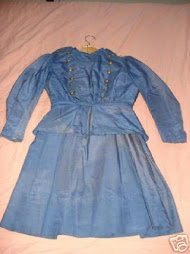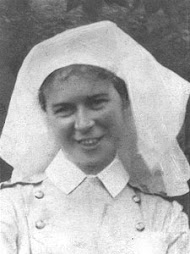Since I began this blog, I have been faced by the challenge of trying to find out more about the real lives of Great War nursing sisters beyond what survives in their military files. Nurses seldom left diaries behind. They were too busy coping with the effects of the war to keep lengthy records. Those that did write diaries often recorded happy moments of reprieve from caring for the wounded--trips to Paris on leave, picnics with other nurses and doctors. After the war, those who survived returned home and their wartime exploits were forgotten--and often, so were they. That is why Passing Through Missing Pages is such a wonderful find. Written by historian Frances Welwood, it describes the remarkable life of Annie Garland Foster, a teacher, Great War nurse, and politician. The book is well-researched and perceptive, providing many insights into the lives of women in the late 19th and early 20th century. Most fascinating for readers of this blog, is Welwood's discovery of Annie's wartime journal at the White Rock Museum and Archives. It provides many observations of Britain during the war, and of what it was like to be a Canadian nurse working in British military hospitals.
Welwood's interest in Foster began when she was invited to create a profile of Foster for a Nelson Museum exhibition called The Women of Nelson: 1880-1950. Foster was to be presented under the banner "Politics and Civil Figures." As she dug into Foster's records, Welwood developed a fascination with the determined, outspoken, groundbreaking woman whose life and contributions had been all but forgotten. It was a fascination that would keep her researching Foster for nearly two decades. What she discovered was that Foster was originally born Annie Harvie Ross in 1875 in Fredericton, New Brunswick, the descendant of Donald McDonald, one of those brave Scottish soldiers who fought on the British side during the American Revolutionary War and eventually settled along the lovely Nashwaak River. Annie's father, Robert Ross, was a hardworking stationary engineer (and sometimes farmer)who ensured that his family--though not affluent--would be able to maintain a respectable, middle class lifestyle. Annie, her sister Margaret and brother James, grew up largely in the small New Brunswick towns and cities where her father could find work.
Annie graduated from high school in 1892 and would receive her BA from the University of New Brunswick in 1896--no mean achievement at a time when many North American universities still did not admit women, and only a select few were able to attend those schools willing to admit them. In the fall of 1896 she enrolled at a small teaching hospital in Somerville, Massachusetts. Within a year, a "schism" between the matron and nursing staff led to the withdrawl of Annie and other "low-ranking colleagues." But she didn't give up on nursing. In the fall of 1897, Annie entered the "Philadelphia Polyclinic," where she trained hard for the next three years. Throughout her education, it was clear that Annie was an outspoken young woman, unafraid to confront issues that were of importance to her. Throughout her life, she would often speak her mind, and occasionally in Welwood's book, Annie comes across as arrogant, convinced of her own opinions, even when those opinions are uninformed or reflect the prejudices of the day. In other words, she is thoroughly human.
Wartime Nurse
After her graduation as a nurse, Foster took a different career path. For the next few years, she taught at some of BC's isolated rural schools. But as war loomed, her life would take a radical turn. On January 16, 1915, she married local newspaper editor William Garland Foster. Foster was an officer in the 54th Kootenay Battalion. With her husband stationed in Vernon, she continued to teach. After her husband's battalion was finally sent overseas in November 1915, Annie left teaching and returned home to New Brunswick. She was nearly 40, an educated, professional woman who felt suddenly useless in the face of a terrible war.
In February 1916, she discovered her husband was in a hospital at the Bramshott military base, suffering from pleurisy. She set sail for England, taking a small notebook with her to record her experiences. Her husband had recovered by the time she arrived, and the pair became tourists in London. Annie's observations were distinctly Canadian--despairing over the lack of central heating and the poor quality of British cuisine (an old prejudice that Welwood echoes--odd, given the breadth of British cuisine today). Her snooty, anti-suffrage views also came to the forefront, as she writes: "Have decided that the vote is the last thing the women in England need--I never saw such god-forsaken children. Why should a race of females who cannot properly bring up their own offspring be trusted witht he national responsibility? It would solve a lot of problems both in the care of children and national problems to make cooks of the whole lot of them--rich and poor." It is clear she had little knowledge of the breadth of poverty in Britain, the ways in which the whole economy was now geared to serving the military (at great sacrifice for the average Briton), and the hard struggle that women campaigners for the suffrage had been making to address social ills and give women a voice in government. It would not be the last time Annie would speak out about issues she didn't always know much about.
Turned down for the CAMC by Matron-in-Chief Margaret MacDonald because she was past the age of enlistment, Annie began her nursing career with the British at Percy House Military Hospital in Ilsworth, in a former workhouse school. During her work there, Annie used her husband's connections to see Richard McBride, the BC Agent General. She wanted him to use his influence to get two of her Canadian colleagues at Percy House into the CAMC posted to France. Her husband didn't want to use his influence to get his wife a similar posting and when Annie was offered a CAMC posting, she turned it down because it wouldn't guarantee she wouldn't get posted to Salonika (a place with a reputation for terrible conditions, as mentioned in other posts on this blog). So she worked in Britain for the rest of the war. In her diary, Annie records seeing zeppelins shot down in her vicinity, day to day life at the hospital, William's departure for service in France, his rare leaves, the lives of the soldiers she cared for, and food shortages. In 1917 she transferred to the hospital at Maxstoke Castle, Warwickshire, and still later, worked at the company hospital of the Brunner Mond munitions factory.
There were many glimmers of happiness during the war--Annie frequently went to London to visit toy exhibitions, museums and craft shops. She had been commission by Canada's Minister of Trade and Commerce to report on "the London toy trade." Welwood writes "Quite how or why Sir George was interested in toys at this critical time in history is hard to imagine..." What Welwood doesn't know is that before the war, Britain (and to some degree Canada) was flooded with beautifully made German toys, from teddy bears to trains to dolls. When the war came, this trade was abruptly stopped. It was unpatriotic to buy Germany products of any kind. Suddenly a new industry had to come to the fore, one that had to operate on limited resources (wood, metal, fabric, etc). Many journalists during this period commented on the development of that trade, one that eventually led to a thriving British toy industry.
In the summer of 1917, exhausted by her 17 months of nursing, Annie resigned and returned home to be with William's family and her own. She was 42 and pregnant; sometime during the voyage, she miscarried. The doctor on board was perpetually drunk and she had to deal with the situation unaided. Back in New Brunswick, she would eventually find herself nursing her parents, who were briefly stricken with the Spanish Flu. But worse was yet to come. On September 30, William Garland Foster was wounded at Cambrai. Annie received notice a few days after he was hospitalized. He would die on October 14, less than a month before the armistice.
Post War
Annie would live a rich and varied post-war life as a teacher, politician, and writer. Her story after the war would take many strange twists and turns, and some of her decisions were often bizarre or at least questionable--including her involvement with a traumatized war veteran who would murder his girlfriend. Throughout, Annie Garland Foster comes across as a complex, intelligent, outspoken and adventurous woman. Her life, charted vividly by Frances Welwood in Passing Through Missing Pages, is well-worth the read.
Passing Through Missing Pages (Caitlin Press: Halfmoon Bay, 2011).
Wednesday, April 25, 2012
Subscribe to:
Post Comments (Atom)






















No comments:
Post a Comment